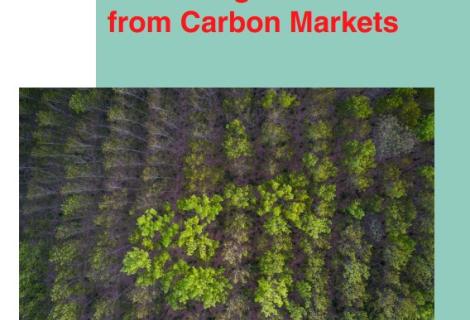
ActionAid Carbon Market Report -Caution Required Protecting Communities from Carbon Markets
This report contains collections of research and case studies that contains clear policy demands for protecting communities engaging with carbon offsets, with particular focus on Liberia and Kenya.
Carbon market mechanisms have long been the favorite climate “solution” among parts of the private sector in the Global North. Proponents argue that countries or companies, unable to cut their emissions in the short term, can fund climate action in places where the opportunities for climate action exceed the available resources. However, any kind of scrutiny of the actual outcomes of carbon market projects uncovers a consistent and overwhelming failure to deliver on their optimistic promises. Carbon market projects almost always fail to provide any real climate benefit; worse, they have a long history of subjecting host communities to various abuses and human rights violations.
Unfortunately, this dismal record has not deterred interest in carbon markets or carbon credits. It is clear,
though, that potential sellers and buyers are responding to different incentives. Buyers – typically corporations or governments – are generally looking to purchase credits because they are aiming for carbon offsets under pressure to reduce emissions that they are not able or willing to do at the moment. On the other hand, sellers – often poorer global south governments or local communities – are generally not motivated by supposed climate benefits, but rather by the need for revenue.
These differing motivations mean our response to buyers and sellers of carbon credits should be appropriately calibrated. On the other hand, we must be cognizant of the often desperate need for revenue motivating those participating in carbon markets as sellers. These sellers should be protected from the harmful side effects of carbon market projects, and alternative forms of revenue (ideally direct climate finance in the form of public, grant-based funding) must be provided.
In the absence of significant fiscal reform, such as debt relief or a massive increase in flows of grant-based public climate finance, Global South governments and communities are likely to seek opportunities in the carbon markets. But carbon markets are not a substitute for climate finance, and their dismal track record, especially of frequent human rights abuses, suggests that extreme caution is needed. It is necessary to consider the steps that must be taken to ensure host communities are well-informed about the risks of selling carbon credits, and the necessary steps to protect and preserve their rights.
This report considers case studies from Kenya and Liberia, which are at different stages of engagement in
carbon market mechanisms. Kenya has a long history of participating in various carbon market schemes, but some of the largest deals have also illustrated the problems. The Northern Range Trust and the Kasigau Wildlife Corridor projects have been tied to increased power imbalances, conflict and violence, and different abuses of host communities.
The projects lacked legitimate Free Prior and Informed Consent (FPIC) from all of the affected populations, and functional grievance mechanisms. They were not consistently established with regard to community land rights laws and UN land tenure guidelines. Additionally, “middle men” and technical consultants took much of the economic benefit before it reached communities.
Liberia, in contrast, is just at the start of its engagement with carbon markets. However, the Liberian government made initial deals without Free Prior and Informed Consent of affected communities, in contradiction to Liberia’s progressive Community Land Rights Law. The largest deal was made with the inexperienced company Blue Carbon, closely tied to the UAE government, which has been making large-scale deals all over the African continent without taking into account community interests.
The Liberian government has begun a process of consultation on a new Carbon Law that offers the opportunity to provide safeguards, but also runs the risk of legitimizing deals that neither benefit the climate nor are fair to communities. CLICK BELOW TO READ OR DOWNLOAD THE FULL REPORT